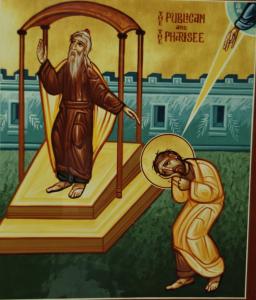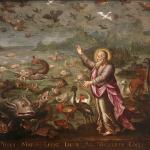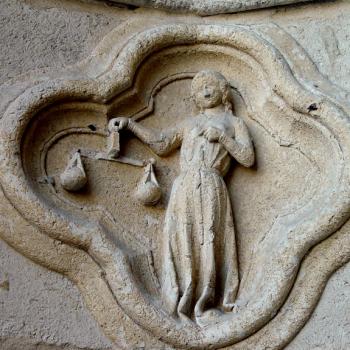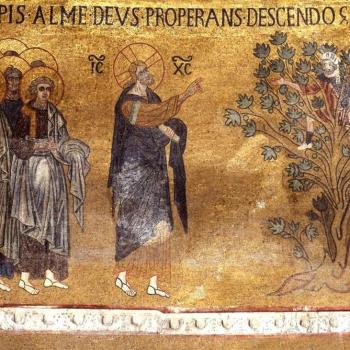
In the Sundays preparing us for the Great Fast, the Byzantine tradition gives us various themes for us to contemplate, such as the one given to us today, the Sunday of the Publican and the Pharisee. Each of these Sundays gives us examples of those who have done good which we should imitate, even as they show us people who represent the worst instincts which most of us have and must fight against. Sometimes, we have a story which puts the two together, which is the case of this week, when we consider what the Publican shows us concerning the kind of humility we should have, as well as what the Pharisee demonstrates, that, the kind of pride we must fight against.
It would be easy for us to misconstrue the point of the stories presented to us in this pre-Fast time by thinking the good demonstrated in them represents who we are while thinking the bad demonstrated in them reveals what is wrong with others. To do this is to ignore the purpose of these stories, as they are meant to help us reflect upon who and what we have become, and to recommit ourselves to the greater good. Indeed, by engaging them in this manner, we fall for the same error that the Pharisee in the parable of the Publican and the Pharisee held. For we end up thinking we are greater than others, so great, indeed, we think God should realize our greatness because of how superior to we are to everyone else:
He also told this parable to some who trusted in themselves that they were righteous and despised others: “Two men went up into the temple to pray, one a Pharisee and the other a tax collector. The Pharisee stood and prayed thus with himself, `God, I thank thee that I am not like other men, extortioners, unjust, adulterers, or even like this tax collector. I fast twice a week, I give tithes of all that I get.’ But the tax collector, standing far off, would not even lift up his eyes to heaven, but beat his breast, saying, `God, be merciful to me a sinner!’ I tell you, this man went down to his house justified rather than the other; for every one who exalts himself will be humbled, but he who humbles himself will be exalted” (Lk. 18:10-14 RSV).
One of the ways this parable can be and has been abused is to follow the spirit of the Pharisee found in the parable by thinking we are so much better and greater than the Pharisees of old, indeed, greater and better than all the Jews, because we are Christians. If we do that, we have fallen for the trap which the story tells us not to fall for. We must not think the story is telling us what all the Pharisees were like, but rather, it is meant to serve as a warning, not to judge ourselves superior to all others because of how zealous we are in following our religious tradition (that is, Christianity). If we think this, we are closed to the change and development God offers us. Thus, we must not use this parable as an excuse to judge or condemn Pharisees, because it does not represent all the Pharisees, but only an anonymous Pharisee who held to a form of pride which can be found in every religious tradition.
We must stop unjustly judging others, which is what happens when we judge others based upon our pride and why we think ourselves to be great. The Publican, the tax collector, is greater than the Pharisee because he had overcome such pride; he knows that he is imperfect; he knows he has and often does wrong, but still looks up to God for help, hoping that with such help he can become better. That hope is what allowed him to accept grace, and through such grace, become justified. We would, however, be wrong if we misunderstood what we are to learn from the Publican. We must embrace a simple, loving humility, and not some sort of self-hatred, thinking there is nothing good within, because such self-hatred ends up having us deny God and God’s grace for us.
Therefore, while we can and should be able to affirm with the Publican that we are sinners, we should realize we are not sinners in the hands of an angry God. God loves us, and, despite what we have might done in our lives, God wants to help us. God wants to heal us from the damage our sins have caused, not only to the world around us, not only to the people we have hurt, but to ourselves. God wants us to be humble, but God also wants us to be loving, to neither judge others with hate or pride, but also, not to be so critical about ourselves we give in to despair. We need to be open to God and God’s love, putting it into effect in our lives so we can work out our salvation, becoming the person God intends us to be. When we do that, we will share that love to others, working to lift them up and make them better instead of simply putting them down. We should not be comparing others to ourselves, however much a temptation it is to do so, even as we must not be comparing ourselves to others; what we must do is get to know ourselves, so that in knowing ourselves, we can accept and love ourselves because of the God good has given to us in our creation. Then we will be able to welcome God’s love for us instead of thinking there is nothing good in us for God to love. There is always something good; no one is absolutely evil, and so no one is outside of the reach of God’s love –however, this is not to say those who have engaged a truly wicked life can be and will be instantly made fine with God, but rather, the more we have embraced injustices and hurt or abused others through pride and hate, the more we will have to work out our own salvation with fear and trembling, going through the purification of God’s fiery love.
Stay in touch! Like A Little Bit of Nothing on Facebook.
If you liked what you read, please consider sharing it with your friends and family!
N.B.: While I read comments to moderate them, I rarely respond to them. If I don’t respond to your comment directly, don’t assume I am unthankful for it. I appreciate it. But I want readers to feel free to ask questions, and hopefully, dialogue with each other. I have shared what I wanted to say, though some responses will get a brief reply by me, or, if I find it interesting and something I can engage fully, as the foundation for another post. I have had many posts inspired or improved upon thanks to my readers.













